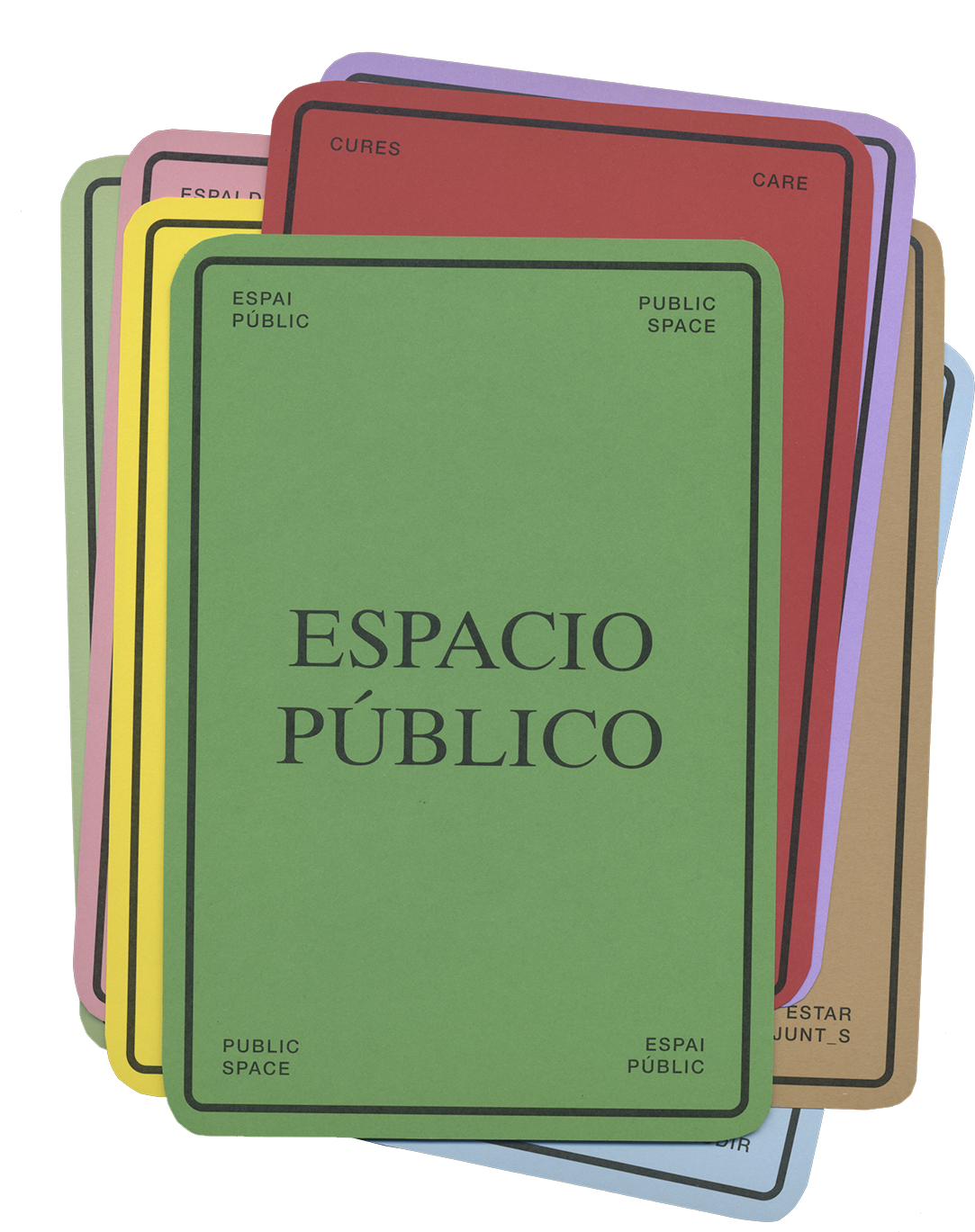
Nancy: I think that we should go back to the issue of public space as a concept, because public space does not exist. The global neoliberalisation process made all spaces to be private. All of them. Streets, neighbourhoods, squares… The only thing left of public space is in the sense of PUBLIC SPHERE, in how we build a collective being, a collective idea that challenges the State and ultimately power itself…
There’s SOMETHING QUITE MISLEADING: one may think that just by standing in a square the public space has been taken. But that is just one of the ways that are visible, and not the one that eventually leads to change … The everyday work of territorial assemblies, neighbourhood associations, local associations, feminist collectives that have their own organisations, all of this is necessary. All of this together and considering WHAT DO WE WANT IN ORDER TO RECLAIM what we could term a public space. I think that from this point here there is something that we have to go back to, we are still lingering over the concept too much…
Ángela: Reclaiming public space as SOMETHING THAT DOESN’T EXIST.
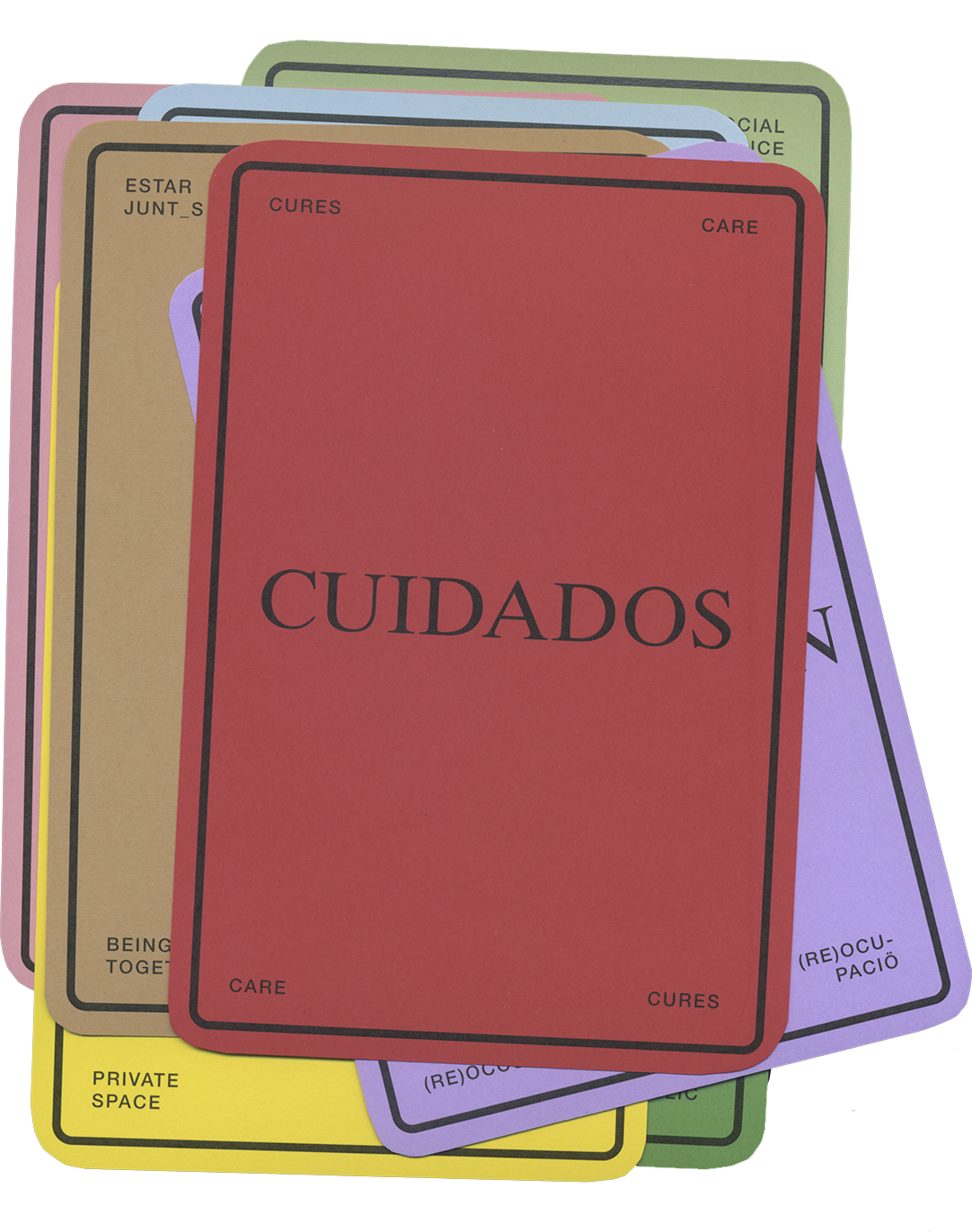
Lina: … At some point maybe I’ll be the one with no energy left… But for now this is what I do. Some time ago I distanced myself from academia, due to some quite uncomfortable processes that I underwent with the grand institution and with eurocentric spaces, which took a lot of my energy… This is how I started to get involved in nueva Usurpada and its processes. One of those processes has been Pazific Encounter… with the Afro-Pacific community in Colombia, that has been such a healing experience for me emotionally. And, from there, I also decided to start doing more ACTIVISMS.
As a result of the state of alarm due to COVID, the Antiracism Care Network started off, I was very involved in it, carrying out a lot of activations in LOGISTICS and also in the EMOTIONAL side of it. It was not only a process of providing cares to people in need, it was also a process of self-care. It healed me and helped me a lot throughout the pandemic, which was very complicated for all of us, myself included. Then, what Nancy was saying about public space and the public, and especially in this case I would say about THE COLLECTIVE… I feel this is linked to that need that sometimes have those who have participated in collective processes or who belong to first peoples, or who in some way have always worked collectively and self-organised. That NEED TO BE A PART OF, a part of something… A process, network, collective work… A part of the need to be a part of itself… Let’s say this is what keeps me working.
And I could say the same regarding cares. When you need to be a part of something and you start to be a part of something, a fabric, a collective, a group, a community, it is because you need care and because you need to take care of others. It is somehow like taking care of those who take care. And when you take care of those who take care, there’s care that is reciprocal and that is organic, it is a practice that takes place in nature itself. For me CARE IS BEING A PART OF. And while being a part of, I found out that there are other things that I have to take care of in order to be a part of myself… In order to be able to take care of myself, of my self-care, to take care of everyone around me.
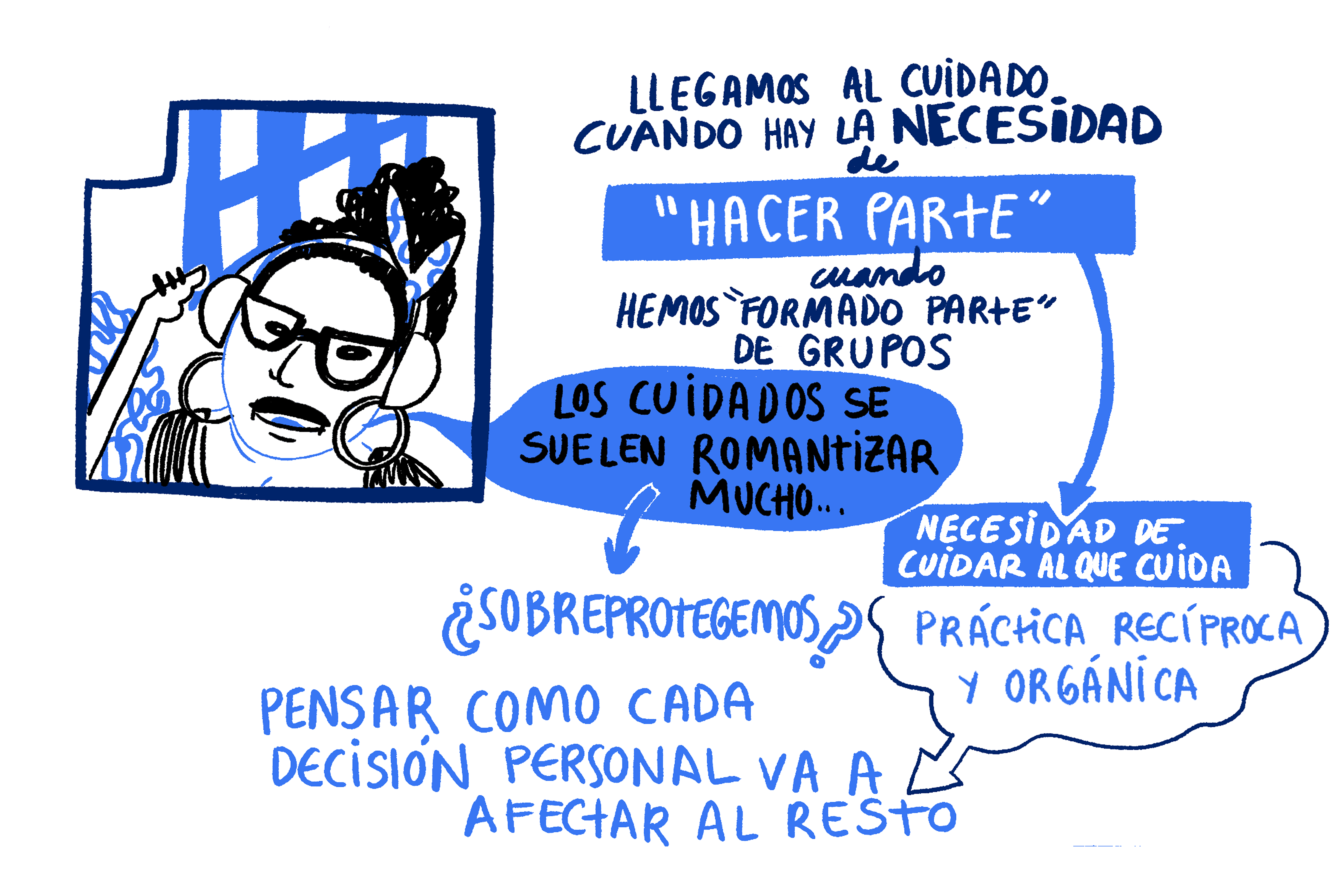
But care also gets romanticized often. Sometimes we say ‘sure, we have to take care of ourselves, I understand, you are in one situation and I am in a different one’, and so judgments start to appear and things get more and more complicated… Some times that’s food for thought, but other times one falls into this rigidity, this knowing, judging and setting levels, and then the issue of care drifts away. Also, that thing of non-stop harmony and happiness… As you engage more and more in care-taking, you realise that that’s not the case at all. If you are someone who is aware that things are not that romantic and that there are always going to be setbacks involved in care-taking, if you realise that while you are care-taking you may also be neglecting other things, that’s when you notice there is a great deal of real work with care-taking, and that it doesn’t have to be neither easy nor chill.
As I see it, that’s what network care is. Sometimes it can happen that we weave the network, and we keep weaving but at some point we may skip one thread… And those threads have to do with taking care of other people, or with the fact that care really needs another person. Or sometimes we may overprotect… It can happen that a person who feels strong and gets involved in the care of another person, makes the mistake of OVERPROTECTING that other person… And thus consciously you are saying to them ‘you need help’ and you skip some threads instead of supporting, collaborating, taking care… Sometimes CARE can also be practiced AS A FORM OF SUPPORT, in which you say ‘look, I’m here and if you need something you know you can let me know’, and that’s all. Not skipping the threads by going further and further and getting out of hand so that eventually, more than a net, it configures something to be untangled…
Nancy: … Very often they ask us for a ‘project about care’… Again? A project about care? So that we just get to theorise about care when actually the institution that is inviting me to carry out this project about care gave me a lousy compensation, abused me, rushed me, stressed me? WHAT CARE ARE YOU TALKING ABOUT?
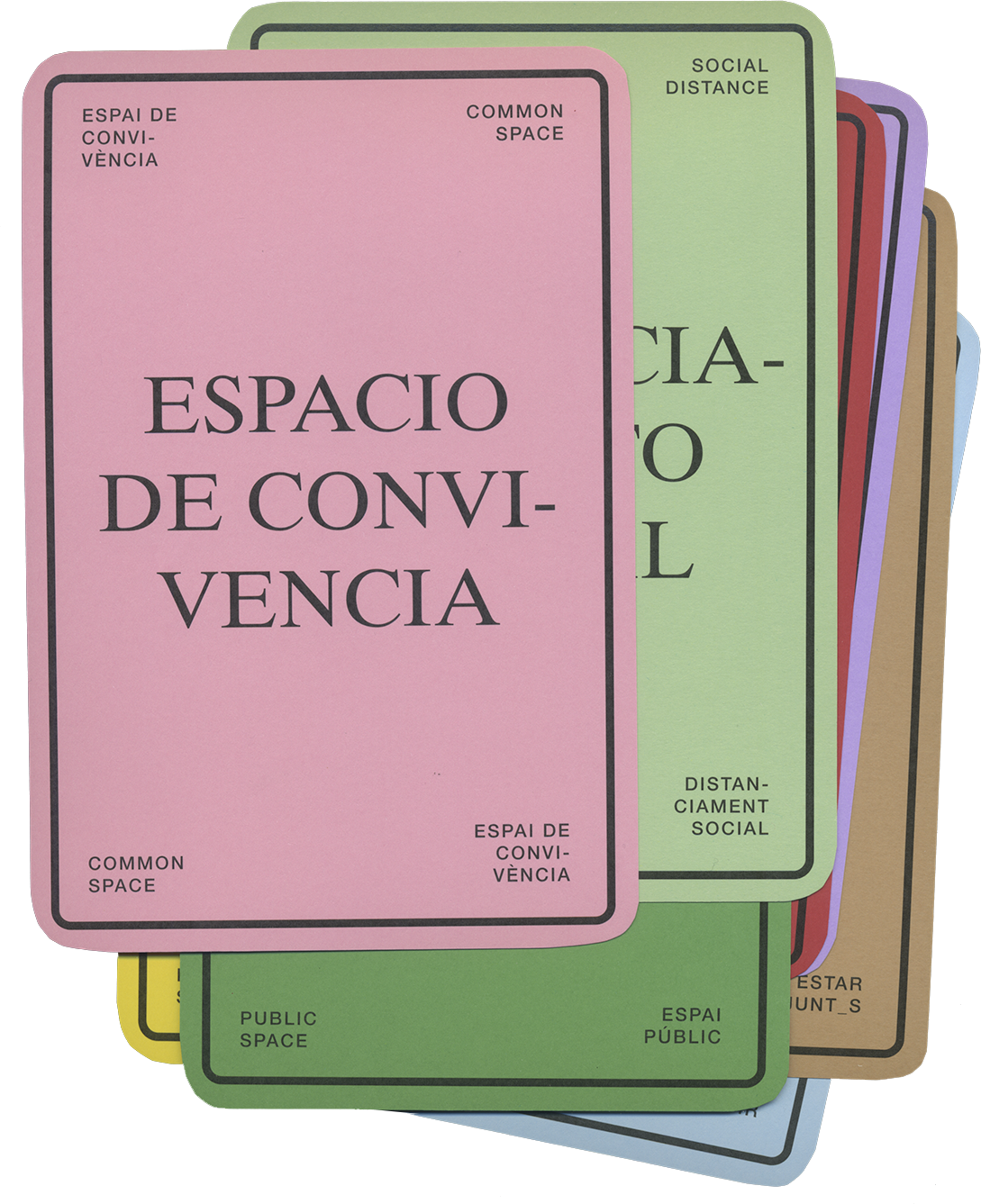
Isamit: … DETAILS AND EVERYDAY ISSUES. They talk about theory, ideology, I don’t know… But I think this is inside the house, in the kitchen, it is in how you behave with your Tupper, your pot and your space. I would like to think that it is also in ARCHITECTURE. And I know I’m digressing now… But I think that all is predetermined to be a man-woman-children family, when we are actually another kind of collectives, of individuals… How does this work in a physical space, in a coexistence space?
Priscila: Generally, I have the feeling that the DIVERSITY OF LIVES and the DIVERSITY OF MOMENTS in each individual life are not taken into account. Tacit agreements, laws… They are made in a homogenising way, as if we were all the same type of person, which is very typical of capitalist societies… Generating everything according to a stereotype, which is completely unreal.
Lina: There is a CULTURE SHOCK as well. That’s coexistence. Each one has their WAYS OF LIVING AND COEXISTING. I think there is not much experience of coexistence here, or at least this is what I have noticed. I don’t think there is any process for coexistence, you just go and coexist. It would appear that one continues to live as if one were living by oneself, no processes, forms, nor dynamics typical of coexistence are generated.
It’s like what I said earlier about romanticizing, in this case ROMANTIZING COEXISTENCE. It is also RESPECTING the forms that people have… and it’s something difficult, very difficult.
I get this a lot with food, because I’m not used to cooking only for myself and so I always made huge dishes, until at some point I had to undergo a process of coexistence in which I learned to cook just for myself and then store whatever would be left over, instead of cooking a lot of food thinking that everybody was going to eat and then being told ‘we don’t like rice…’ So, A PROCESS OF NOT GETTING UPSET IS NEEDED, of not being disappointed by things like that, understanding that people have their own coexistence dynamics and that’s something very complex. And not only complex, we need that care towards the other person, not assuming things in advance … It’s a bit difficult. This specific issue with food was really extremely difficult for me. Then there are a bunch of other coexistence dynamics that, well, they just BOTHER you.
I’ve had many coexistence spaces, but I’ve only kept some of them, and these are the ones that are care spaces, they are migrant spaces in which somehow there is a common sense towards other kinds of collective dynamics or practices in which TAKING THE WHOLE INTO ACCOUNT IS APPRECIATED and that things are not done individually. These are spaces where this is much appreciated. Many times criticism arises regarding this type of spaces – ‘Those are such closed spaces!’ Well, the thing is… Sometimes, as part of care-taking, when those who live together are aware of collective care, and that in each collective there are different needs, we also need to take care of other people not entering … with other thoughts and other understandings. We need to be careful with that. Because they are spaces to take care of the needs that we have collectively … I wish we could all live together… But that’s way too much romanticism [laughs]. Can’t we get this Catalan rural construction, a masia, where we all migrants could live? Or maybe not…? … It could be a utopian dream, and it could be wonderful.
(…) Somehow I bounced what Nancy said earlier about public space… That there has not really been any GRASSROOTS WORK, something that keeps going constantly generating things…
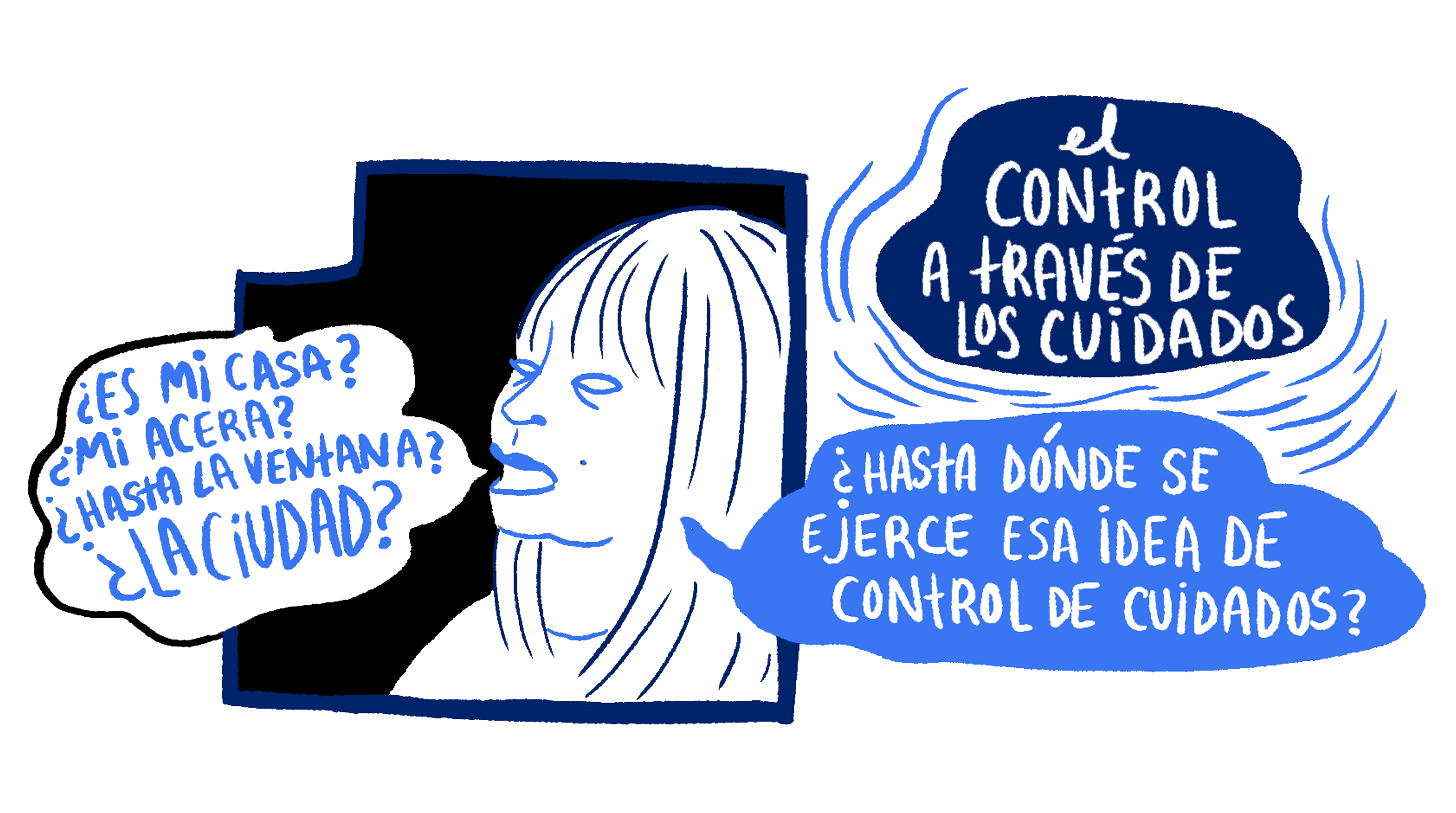
Priscila: […] In my neighbourhood, when lockdown ended, the INTENSITY of coexistence that there was in the beginning ended. WHY WEREN’T WE ABLE TO KEEP IT? Obviously due to different dynamics… Each one went back to their own situations. However, a relationship beyond the private space has been maintained. There was also another type of relationship with those who participate in coexistence and those who don’t. It was interesting in order to question this idea of how we coexist, how and what are these spaces of coexistence, how they are LINKED TO THE PRIVATE SPHERE, with this idea of a typical family that was earlier mentioned by Isamit…
Isamit: […] This has also been a conversation that I had with a number of friends, in a space where I participate from time to time, the Futch Club. It’s a space where assemblies are organised with artists, non-artists, and people who want to be there precisely to TALK TOGETHER. We realised there is this need of SHARING and GETTING TO KNOW HOW WE FEEL.